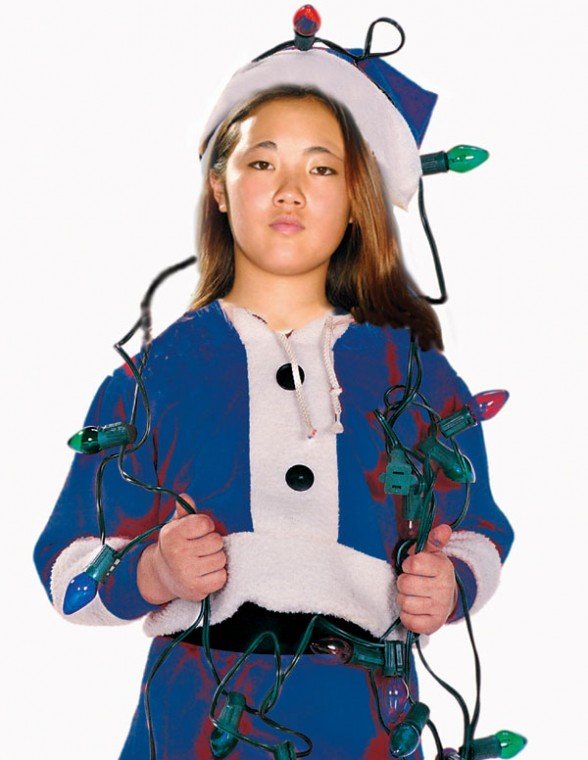Santa pops up everywhere. Shopping malls overflow with music.
You start to imitate a little dance and then, in an ordinary kind
of way, your bag breaks. The lightness slips out
– again.
Santa pops up everywhere. Shopping malls overflow with music. You start to imitate a little dance and then, in an ordinary kind of way, your bag breaks. The lightness slips out – again.
“Society says you are supposed to be happy at Christmas, but adults have a lot of responsibility,” said Donna Cohen Cretcher of Morgan Hill, a psychotherapist who counsels individuals and families.
The pressure of creating the ideal holiday, and being busier, may bring on that thing called the holiday blues from about mid-October to the beginning of January.
That “fog” can be the physical condition known as Seasonal Affective Disorder (SAD), a down feeling caused by lack of light during winter from a biochemical imbalance in the body.
Or it may be the holiday blues.
“People who suffer from depression all year, who have trouble handling stress, are most vulnerable to the blues at this time,” Cretcher said. This stress could be common for many at Christmastime, she said.
“We wear ourselves out trying to celebrate. We are expected to be happy, but we are really fragile. Instead, the children are unappreciative, the relatives are difficult.”
The more you internalize the stress, the worse it may get, the counselor said.
What to do?
Set up reasonable expectations, and learn to say no. “You can create a manageable holiday,” she said. “Holidays are especially difficult for people who have had a significant loss, such as the death or departure of a loved one,” she said. “Come up with some symbolic activity that helps you remember that missing person in a positive way.”
Bottom line: If you expect to be surrounded by 25 happy people, you’ll be disappointed.
“It is a very real thing and people can go into a funk at holiday time,” said the Rev. Malcolm McPhail, pastor of New Hope Community Church in Gilroy. “I think it can get so serious that people can end their lives,” said McPhail, a chaplain with Gilroy Police Department and a pastoral counselor.
“See a counselor, priest, or rabbi,” he said. “Get counseling.”
Having the blues is a case-by-case situation and everyone is different, he said. McPhail recommends anticipating any holiday difficulties by reliving good memories.
“Instead, treasure the good times. Look at the happier times in a scrapbook,” he said. Maintain your routine. Involve children in your life. There is “an appointed time for everything,” said McPhail, recalling a popular verse from Ecclesiastes in the Old Testament of the Bible.
Debbie Ruiz, a case manager with Community Solutions in Hollister, said financial problems can affect the holidays.
“If a parent has gotten laid off, it puts a lot of strain on the family to fulfill society’s expectations.” Ruiz recalled one family with six children and three others who lived with them. “The parents said no to our toys,” Ruiz recalled. “They wanted backpacks. It humbled me to think that, for them, having these presents was a luxury.”
Ruiz recommends returning to traditional values for the holidays. Get together to make tamales, cookies or crafts; have a party at home.
“See what you can do to combat high holiday expectations. Decide what you can really make and what brings you happiness.”
Barry Goldman-Hall, a clinical director of Community Solutions based in Santa Clara and northern San Benito counties, says a sense of sadness can balloon at Christmas with the barrage of messages about holiday cheer, the perfect gift, perfect tree or perfect family get-together, but when reality hits, we have a sense we failed.
The holidays are not the time to resolve family hurts, he said. “Temper your expectations. Take care of yourself. Walk, exercise, read a book, listen to music, get enough sleep, spend time with people who are easy to be with,” said Goldman-Hall. “You don’t have to be super-human.”
Above all, don’t isolate yourself.
“My recommendation is to socialize, whether at church, volunteering or with the people next door. Don’t isolate. Talk to people. Share,” said Deborah Korte of Gilroy, a hypnotherapist.
“A lot of people equate the holiday blues with SAD, which affects 6 percent of the U.S. population,” Korte said. “But there are a lot of regular, everyday depressing factors, such as family, social problems, overeating and other behavioral concerns that increase at this time. I think it’s relative to the individual.”
Korte said she tries to guide people through the season. “I teach people to relax and have control over their lives. I’m not waving a watch. As a results coach, I help people find the root cause of the blues.”
Like a surfer diving in and mastering the waves, we must experience our feelings of sadness and grief first, said Mike Crowley, a marriage and family therapist and founder of the Helping Hands ministry at South Valley Community Church in Gilroy.
“The real holiday blues is avoiding pain, but you can’t sidestep real feelings,” he said. He recommends keeping a journal of your feelings to help you sort them out and writing down one positive affirmation every day.
“The key to health is having relationships, even with a pet. We substitute drugs and alcohol to medicate our pain but it doesn’t work,” said Crowley, who counsels people with addictive behaviors.
So steps can be taken to avoid the holiday blues, and the most important thing is having a good attitude.
“There is no one thing that causes the holiday blues. They are multi-dimensional,” said LaVonne Atnip of Morgan Hill, a life counselor and ordained minister. “But we can inject fun into our lives. Watch an old movie on television. Invite a few people in. Decorate or do something to bring back good memories. Just say you are not going to allow the blues. It boils down to our own attitude.”
So enjoy, but as Atnip says, “Don’t overdo.”















